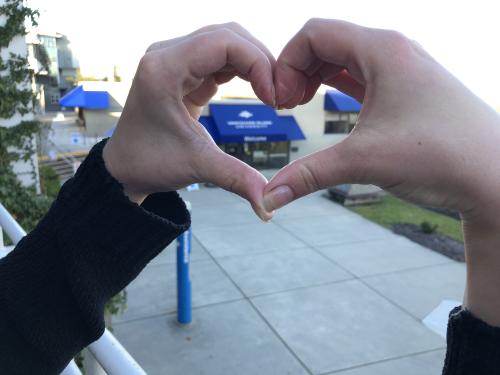Celebrating Indigenous mentorship at VIU
Vancouver Island University’s ‘su’luqw’a’ Community Cousins Aboriginal student mentorship program is celebrating its 10th anniversary in September 2021. In honour of this important milestone, we are sharing the stories of 12 people closely connected with the program – one per month – leading up to the anniversary.
The ‘su’luqw’a’ Community Cousins program builds capacity for mentors to gain leadership and employability skills through outreach and mentoring activities. Students hone skills in self-awareness, communication, leadership, self-care and an exploration of personal values, with an emphasis on “telling one’s story” as a path to self-empowerment through outreach to others.
Xulsimalt – Gary Manson’s connection to Vancouver Island University began in 2008 when he was asked to skip the VIU canoe from Port Hardy to Duncan for Tribal Journeys – an annual event where Indigenous peoples along the Pacific Northwest Coast travel via ocean-going canoes to a different host Nation each year. It was the first year VIU had participated with staff and students.
The Snuneymuxw First Nation member, who worked in the commercial fishing industry, regularly participated in Tribal Journeys up and down the West Coast. That first journey, spending 10 days in VIU’s Munu canoe, he met many of the staff in the Office of Aboriginal Education and Engagement who he would come to work closely with later.
He became a VIU Elder-in-Residence in 2011 and one of his first projects was supporting the ‘su’luqw’a’ Community Cousins Aboriginal student mentorship program, a new program that was just starting up with the goal of helping Indigenous students connect to culture, develop leadership skills and create community and a sense of belonging at university.
During the first years of the program, Manson, a residential school survivor, focused on sharing his story about his time at residential school and how that experience affected his life.

“I have told my story many times and been brutally honest in the telling. It doesn’t hit home unless you go to that place.”
Manson, who was born on the mouth of the Snuneymuxw (Nanaimo) River in 1948 and now lives 100 feet from where he was born, is deeply connected to his culture and the land. He has done a lot of cultural work with his band, including some work around language, and also a lot of work with House of Healing, an organization that gathered residential school survivors together for healing circles. Watching how sharing his story and culture with students becomes a transformative experience for them keeps him energized to continue on.
“The students have become fully awake to the suppression of our people and they are really wanting to find their roots now,” says Manson. “Many of them were disconnected from their cultures. A lot of them were never brought up on a reservation, so I speak to that, to the residential school history and how important it is for me to see them here because I never went to high school.”
Sheena Robinson, a VIU Bachelor of Arts alum from Heiltsuk Nation who was an active member of the ‘su’luqw’a’ Community Cousins, says hearing Uncle Gary tell his story made her realize that she could tell hers too and that the historical connection to the trauma of residential schools could and should be acknowledged.
“I didn’t grow up with my culture, so I didn’t have Elders to talk to before I came to VIU,” she says. “Uncle Gary was really important in me learning to sit, watch and listen. It made me really appreciate the territory that I’m on – just having him there, telling us stories and making us laugh.”
Working with Manson has been a learning journey for Sylvia Scow, Manager of Indigenous Protocol, as well.
“Uncle Gary reminds me of the importance of sharing the truth,” says Scow, who is also a residential school survivor. “We always talk about truth and reconciliation and want to go straight to the reconciliation part, but we need to remember that the truth is really important. I’ve never shared my story as much as I have after listening to Uncle.”
In the last 10 years, Manson has watched the program grow from a handful of students to now 110. The program continues to find more and more ways to incorporate culture into various activities, from a walk in the bush or a canoe ride, to sharing history and culture with the rest of the VIU community by organizing special events, to reviving the tradition of thuy thut, a Coast Salish phrase that means “fixing up,” to help students prepare their minds, bodies and spirit for the day.
“When your fix yourself, you’re preparing yourself to be the best human being you can be – maybe you won’t participate in road rage that day!” he jokes. “The conversation usually starts light and often goes deeper. Some hold their thoughts in, not sure if they should say them out loud. They wait until they are comfortable, or they might come to us later and say it privately.”
Manson loves watching the mentors embrace culture, succeed at school and grow as individuals.
“The fact they are here is so important – they are paving the way for others,” he says. “I’ve had people fall down after they left the university and call me. I’ve helped some stand up again. There’s a lifetime commitment to your relationship with them.”

Special thanks to our supporters
The Community Cousins is generously supported by the RBC Foundation, The Peter Cundill Foundation and many other valued community donors and partners.
Related Posts
Got an article idea for the blog? Email students@viu.ca.



